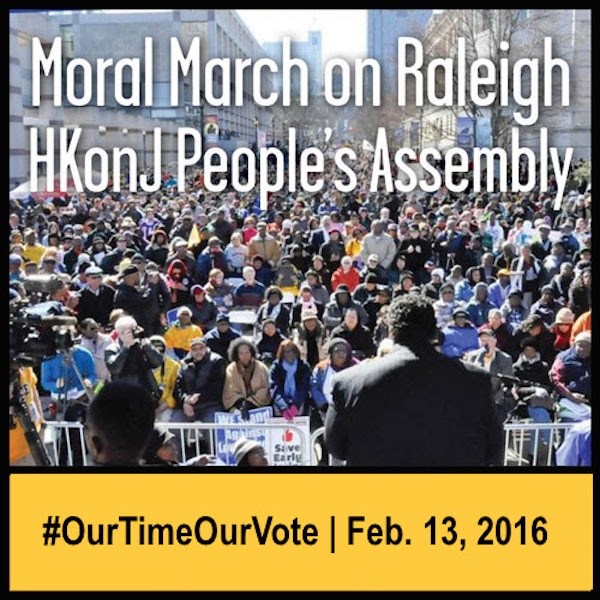N.C. voting rights fight moves from the courtroom to the streets

This year's Moral March on Raleigh will be more than just a march: Planners are calling it an "organizing mobilization in the public square."
As the federal trial over North Carolina's restrictive voter ID law wrapped up this week in Winston-Salem, the N.C. NAACP — the lead plaintiff suing the state over its ID requirements — was getting ready to shift its fight for voting rights from the courtroom to the streets.
The civil rights group serves as the lead organizer of the annual Mass Moral March on Raleigh, which takes place this year on Saturday, Feb. 13 and involves over 150 supporting organizations. In its 10th year now, the march will kick off at Shaw University — the historically black school where the Student Nonviolent Coordinating Committee was formed in 1960 — and wind through downtown before ending near the state capitol. It's expected to draw thousands of people to rally for a 14-point legislative agenda calling for well-funded public schools, living wages and health care for all.
This year's march will have a special focus on voting rights with the theme, "This Is Our Selma, This Is Our Time, This Is Our Vote," recalling the historic 1965 voting rights movement marches in Alabama. The lineup of speakers will feature ordinary North Carolinians who've been affected by restrictive new voting rules the state adopted after the U.S. Supreme Court hobbled the Voting Rights Act in 2013. And the march's ambassadors will include David Goodman, brother of voting rights activist Andrew Goodman, who along with fellow activists James Cheney and Michael Schwerner was murdered by the Ku Klux Klan in Mississippi in 1964.
"We will not give up on our democracy," Rev. Dr. William Barber II, president of the N.C. NAACP and architect of the Moral Movement, said during a press conference held this week to discuss the trial and the march. "We must stand up and continue to fight in the courts, in the streets and at the ballot box."
The Feb. 13 event will be more than just a march, however: It will also be what Barber called an "organizing mobilization in the public square."
Organizers there will call on faith communities to join in a Souls to the Polls voter registration, education and protection program that the state NAACP launched in December, with training session taking place immediately following the march (click here to register). They will also enlist marchers to form what Barber described as a "mighty volunteer army" to ensure North Carolinians can and will vote in the state's March 15 primary and the Nov. 8 general election. The voter campaign aims to be active in 90 of North Carolina's 100 counties, with organizers undertaking what Barber described as a "deep dive" in 55 of them.
"Because we have to," Barber said. "We have no choice."
A top concern of organizers is confusion over the state's voter ID requirements. When the legislature passed a new voting law in 2013, it required would-be voters to show one of a limited number of acceptable forms of identification, sparking legal action by the NAACP and other voting rights groups that charged the new rules abridged citizens' fundamental right to vote.
With concern mounting that the ID rules would not pass constitutional review, state lawmakers approved a bill late in last year's legislative session changing the requirements. Under the new law, voters who lack one of the approved forms of ID due to a "reasonable impediment" such as illness, transportation problems or a lack of needed documents will be able to vote by provisional ballot if they sign a declaration describing the impediment and provide the last four digits of their Social Security number and their birthdate, or present their current voter registration card, or show a document with their name and address such as a utility bill, bank statement or paycheck.
The state elections board has produced public service announcements and other educational materials explaining the new ID requirements, but they don't prominently discuss the reasonable impediment provision. The board has also moved slowly on training poll workers to apply the new rules properly. And under questioning from U.S. District Court Judge Thomas Schroeder, who's presiding over the voter ID trial, the state elections board director revealed there's uncertainty about exactly how the new provision will work.
The decision on the voter ID law is now in the hands of Schroeder, an appointee of former President George W. Bush. Attorneys for the NAACP have said they think a ruling before the state's March 15 primary is unlikely, so voters will likely cast ballots under the current rules.
"We have to do a lot of education," Barber said. "This is just a bad law."
Watch the promotional video for the march here:
Tags
Sue Sturgis
Sue is the former editorial director of Facing South and the Institute for Southern Studies.
